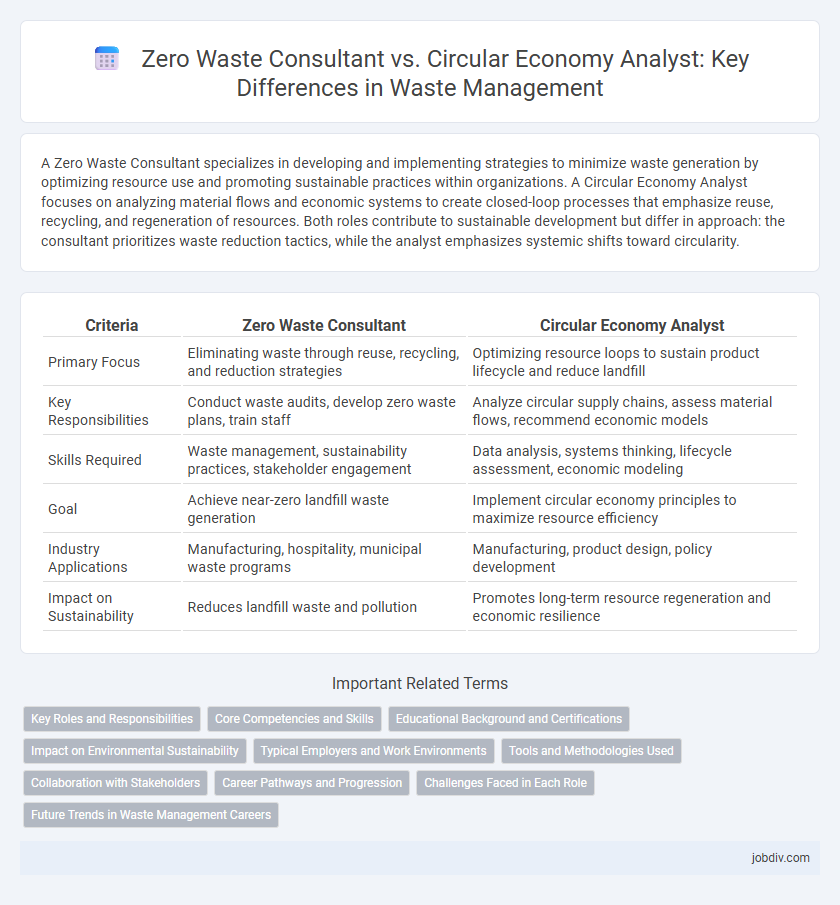A Zero Waste Consultant specializes in developing and implementing strategies to minimize waste generation by optimizing resource use and promoting sustainable practices within organizations. A Circular Economy Analyst focuses on analyzing material flows and economic systems to create closed-loop processes that emphasize reuse, recycling, and regeneration of resources. Both roles contribute to sustainable development but differ in approach: the consultant prioritizes waste reduction tactics, while the analyst emphasizes systemic shifts toward circularity.
Table of Comparison
| Criteria | Zero Waste Consultant | Circular Economy Analyst |
|---|---|---|
| Primary Focus | Eliminating waste through reuse, recycling, and reduction strategies | Optimizing resource loops to sustain product lifecycle and reduce landfill |
| Key Responsibilities | Conduct waste audits, develop zero waste plans, train staff | Analyze circular supply chains, assess material flows, recommend economic models |
| Skills Required | Waste management, sustainability practices, stakeholder engagement | Data analysis, systems thinking, lifecycle assessment, economic modeling |
| Goal | Achieve near-zero landfill waste generation | Implement circular economy principles to maximize resource efficiency |
| Industry Applications | Manufacturing, hospitality, municipal waste programs | Manufacturing, product design, policy development |
| Impact on Sustainability | Reduces landfill waste and pollution | Promotes long-term resource regeneration and economic resilience |
Key Roles and Responsibilities
Zero Waste Consultants develop strategies to minimize waste generation by promoting reuse, recycling, and resource efficiency within organizations and communities. Circular Economy Analysts focus on evaluating and designing systems that enable continuous material cycles, assessing environmental impacts, and identifying opportunities for sustainable economic growth. Both roles require expertise in waste management, but Zero Waste Consultants emphasize practical waste reduction, while Circular Economy Analysts prioritize systemic change and long-term resource optimization.
Core Competencies and Skills
Zero Waste Consultants specialize in waste reduction strategies, resource efficiency, and sustainable materials management, emphasizing practical implementation of zero waste principles in businesses and communities. Circular Economy Analysts focus on systemic analysis, designing closed-loop systems, and evaluating economic and environmental impacts of resource circulation through data analysis and modeling. Both roles require strong knowledge in environmental regulations, stakeholder engagement, and sustainability metrics, with consultants leaning towards operational expertise and analysts prioritizing strategic planning and policy assessment.
Educational Background and Certifications
Zero Waste Consultants typically possess educational backgrounds in environmental science, sustainability, or waste management, often complemented by certifications such as LEED Green Associate or Zero Waste Specialist credentials. Circular Economy Analysts generally hold degrees in environmental economics, industrial engineering, or resource management, with certifications like Circular Economy Practitioner or Cradle to Cradle Accredited Professional enhancing their expertise. Both roles emphasize specialized training in sustainable practices, data analysis, and lifecycle assessment to optimize waste reduction strategies and resource efficiency.
Impact on Environmental Sustainability
Zero Waste Consultants drive environmental sustainability by implementing strategies that minimize landfill waste and promote reusable materials, directly reducing pollution and resource depletion. Circular Economy Analysts focus on systemic redesign, optimizing resource cycles to ensure products and materials remain in use longer, which enhances ecological resilience and reduces carbon footprints. Both roles contribute significantly to sustainability, but the consultant focuses on operational waste reduction while the analyst emphasizes systemic economic transformation.
Typical Employers and Work Environments
Zero Waste Consultants typically find employment in environmental consulting firms, non-profit organizations, and corporate sustainability departments, where they focus on reducing waste generation through practical strategies and educational programs. Circular Economy Analysts often work within government agencies, research institutions, and multinational corporations, analyzing material flows and developing circular business models to promote resource efficiency. Both roles operate in office settings but frequently collaborate with manufacturing sites, policy makers, and community stakeholders to implement sustainable waste management solutions.
Tools and Methodologies Used
Zero Waste Consultants employ tools such as waste audits, lifecycle assessments, and material flow analysis to identify reduction opportunities and enhance resource efficiency within organizations. Circular Economy Analysts utilize methodologies including system modeling, value chain mapping, and circularity indicators to design regenerative systems and optimize resource loops across industries. Both roles rely heavily on data analytics software and sustainability frameworks to drive actionable insights and implement scalable waste minimization strategies.
Collaboration with Stakeholders
Zero Waste Consultants collaborate closely with businesses, local governments, and community groups to design and implement strategies that minimize waste generation and promote sustainable resource use. Circular Economy Analysts engage with supply chain partners, policymakers, and industry experts to assess and optimize material flows, ensuring closed-loop systems and long-term economic resilience. Both roles require strong stakeholder collaboration to drive systemic change towards waste reduction and resource efficiency.
Career Pathways and Progression
Zero Waste Consultants typically focus on waste reduction strategies within organizations, emphasizing resource optimization and sustainable practices to minimize landfill contributions. Circular Economy Analysts analyze systemic economic models that prioritize regeneration, resource efficiency, and closed-loop processes, often advising on policy or corporate strategy for long-term sustainability. Career progression for Zero Waste Consultants often leads to roles in environmental compliance or sustainability management, while Circular Economy Analysts may advance to strategic advisory positions or lead innovation in sustainable business models.
Challenges Faced in Each Role
Zero Waste Consultants face challenges in changing consumer behavior and implementing sustainable waste reduction strategies within diverse industries, often encountering resistance to new practices. Circular Economy Analysts struggle with analyzing complex supply chains to identify circular opportunities and quantifying environmental and economic impacts amid varying regulatory frameworks. Both roles require advanced skills in data analysis and stakeholder engagement to drive systemic change towards sustainability.
Future Trends in Waste Management Careers
Zero Waste Consultants specialize in designing strategies that eliminate waste generation through efficient resource use and sustainable practices, directly supporting circular economy goals. Circular Economy Analysts focus on analyzing and optimizing systems to promote reuse, recycling, and regenerative processes across supply chains, driving systemic change in waste management. Emerging trends emphasize integration of digital tools such as AI and IoT, increasing demand for professionals who can implement data-driven circular solutions and zero waste initiatives in diverse industries.
Zero Waste Consultant vs Circular Economy Analyst Infographic

 jobdiv.com
jobdiv.com